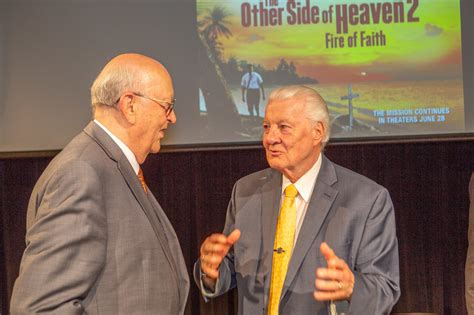A Quote by Nathaniel Branden
Most of us are taught from an early age to pay far more attention to signals coming from other people than from within. We are encouraged to ignore our own needs and wants and to concentrate on living up to others expectations.
Related Quotes
One of the most effective ways to overcome anxiety is to try to shift the focus of attention away from self and toward others. When we succeed in this, we find that the scale of our own problems diminishes. This is not to say we should ignore our own needs altogether, but rather that we should try to remember others' needs alongside our own, no matter how pressing ours may be
Do you think that we're products of our environments? I think so, or maybe products of our expectations. Others' expectations of us or our expectations. I mean others' expectations that you take on as your own. I realize how difficult it is to seperate the two. The expectations that others place on us help us form our expectations of ourselves.
Our sense of identity is in large measure conferred on us by others in the ways they treat or mistreat us, recognize or ignore us, praise us or punish us. Some people make us timid and shy; others elicit our sex appeal and dominance. In some groups we are made leaders, while in others we are reduced to being followers. We come to live up to or down to the expectations others have of us.
We usually do pay attention to our outer appearance, typically noticing whatever part of our bodies we are unhappy about. It behooves us, however, to get on very good terms with more than just the surface of our bodies as we grow older; for if we don't listen to our bodies and pay attention to our physical needs and pleasures, this vehicle that we need to be running well to take us into a long and comfortable life, will limit what we can do and who we become.
The best way I have found to follow my true desires is to pay attention to my intuitive sense. We all have great wisdom within us, a part of us that knows exactly what we need at every moment. We are born with this intuitive sense, but most of us are quickly taught to distrust and ignore it. We have to relearn something that should come naturally. Fortunately, it's not too difficult; it just takes some practice.
My happiness is not dependent on others; it comes from within. Spiritual growth in a person is never encouraged, but it is important. I don't know why people want to judge others instead of doing their own thing. I firmly feel that I don't need to follow or live according to other people's rules. I like living life the way I want to.
From the simplest lyric to the most complex novel and densest drama, literature is asking us to pay attention. Pay attention to the frog. Pay attention to the west wind. Pay attention to the boy on the raft, the lady in the tower, the old man on the train. In sum, pay attention to the world and all that dwells therein and thereby learn at last to pay attention to yourself and all that dwells therein.
Most people don't know how to listen because the major part of their attention is taken up by thinking. They pay more attention to that than to what the other person is saying, and none at all to what really matters: the Being of the other person underneath the words and the mind. Of course, you cannot feel someone else's Being except through your own. This is the beginning of the realization of oneness, which is love. At the deepest level of Being, you are one with all that is.
We must pay close attention to the signals our body sends - the aches and pains, digestions and indigestions, increased energies and exhaustions. Our body sends us signals about the correct 'spelling' of our lives. These sensations are the sum of complex inner computations that we must learn to interpret.
God has made us so that we must be mutually dependent. We may ignore our own dependence, or refuse to acknowledge that others depend upon us in more respects than the payment of weekly wages; but the thing must be, nevertheless. Neither you nor any other master can help yourselves. The most proudly independent man depends on those around him for their insensible influence on his character - his life.





































